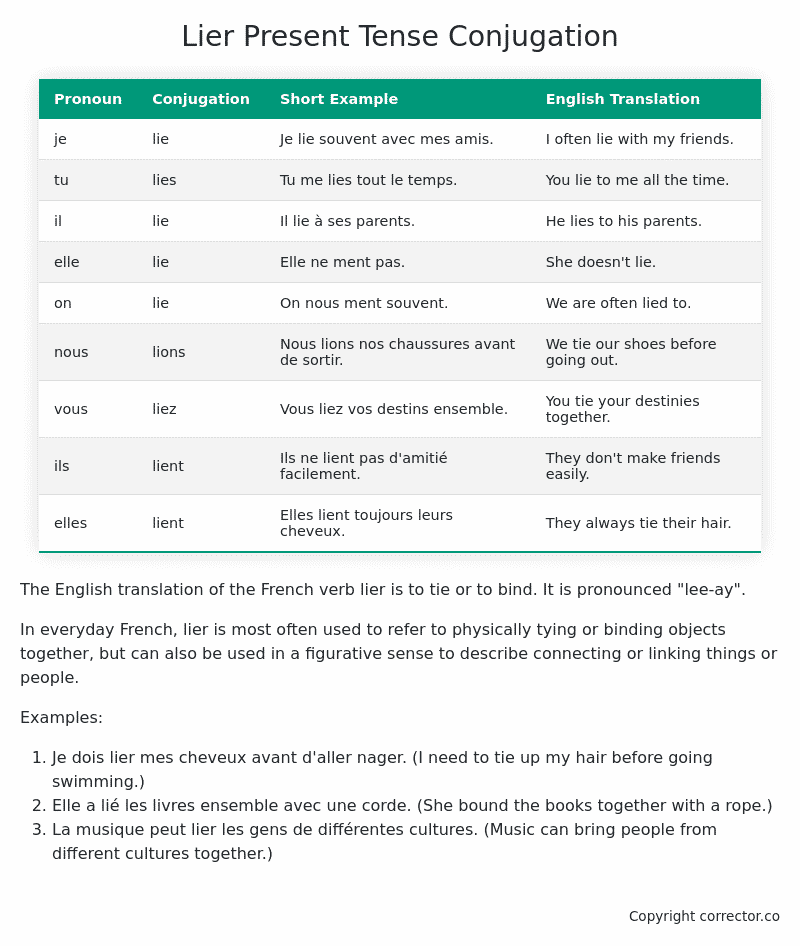Le Present (Present Tense) Conjugation of the French Verb lier
Introduction to the verb lier
The English translation of the French verb lier is to tie or to bind. It is pronounced “lee-ay”.
In everyday French, lier is most often used to refer to physically tying or binding objects together, but can also be used in a figurative sense to describe connecting or linking things or people.
Examples:
- Je dois lier mes cheveux avant d’aller nager. (I need to tie up my hair before going swimming.)
- Elle a lié les livres ensemble avec une corde. (She bound the books together with a rope.)
- La musique peut lier les gens de différentes cultures. (Music can bring people from different cultures together.)
Lier – About the French Present Tense
To take a deep dive into all the French tenses then see our article on Mastering French Tense Conjugation.
Common Everyday Usage Patterns For Le Present
Interactions with Other Tenses
Table of the Present Tense Conjugation of lier
| Pronoun | Conjugation | Short Example | English Translation |
|---|---|---|---|
| je | lie | Je lie souvent avec mes amis. | I often lie with my friends. |
| tu | lies | Tu me lies tout le temps. | You lie to me all the time. |
| il | lie | Il lie à ses parents. | He lies to his parents. |
| elle | lie | Elle ne ment pas. | She doesn’t lie. |
| on | lie | On nous ment souvent. | We are often lied to. |
| nous | lions | Nous lions nos chaussures avant de sortir. | We tie our shoes before going out. |
| vous | liez | Vous liez vos destins ensemble. | You tie your destinies together. |
| ils | lient | Ils ne lient pas d’amitié facilement. | They don’t make friends easily. |
| elles | lient | Elles lient toujours leurs cheveux. | They always tie their hair. |
Other Conjugations for Lier.
Le Present (Present Tense) Conjugation of the French Verb lier (this article)
Imparfait (Imperfect) Tense Conjugation of the French Verb lier
Passé Simple (Simple Past) Tense Conjugation of the French Verb lier
Passé Composé (Present Perfect) Tense Conjugation of the French Verb lier
Futur Simple (Simple Future) Tense Conjugation of the French Verb lier
Futur Proche (Near Future) Tense Conjugation of the French Verb lier
Plus-que-parfait (Pluperfect) Tense Conjugation of the French Verb lier
Passé Antérieur (Past Anterior) Tense Conjugation of the French Verb lier
Futur Antérieur (Future Anterior) Tense Conjugation of the French Verb lier
Subjonctif Présent (Subjunctive Present) Tense Conjugation of the French Verb lier
Subjonctif Passé (Subjunctive Past) Tense Conjugation of the French Verb lier
Subjonctif Imparfait (Subjunctive Imperfect) Tense Conjugation of the French Verb lier
Subjonctif Plus-que-parfait (Subjunctive Pluperfect) Tense Conjugation of the French Verb lier
Conditionnel Présent (Conditional Present) Tense Conjugation of the French Verb lier
Conditionnel Passé (Conditional Past) Tense Conjugation of the French Verb lier
L’impératif Présent (Imperative Present) Tense Conjugation of the French Verb lier
L’infinitif Présent (Infinitive Present) Tense Conjugation of the French Verb lier
Struggling with French verbs or the language in general? Why not use our free French Grammar Checker – no registration required!
Get a FREE Download Study Sheet of this Conjugation 🔥
Simply right click the image below, click “save image” and get your free reference for the lier Present Tense tense conjugation!

I hope you enjoyed this article on the verb lier. Still in a learning mood? Check out another TOTALLY random French verb present conjugation!


